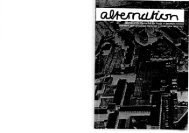Re-reading The Purloined Letter - Alternation Journal
Re-reading The Purloined Letter - Alternation Journal
Re-reading The Purloined Letter - Alternation Journal
You also want an ePaper? Increase the reach of your titles
YUMPU automatically turns print PDFs into web optimized ePapers that Google loves.
391<br />
<strong>Re</strong>-<strong>reading</strong> <strong>The</strong> <strong>Purloined</strong> <strong>Letter</strong><br />
Derrida criticizes Lacan for failing to make reference to Poe, the<br />
author in his literary analysis of the story. He compares Lacan’s analysis to<br />
that of Marie Bonaparte’s psychobiography. I believe that it is an unfair<br />
criticism, as referencing the author himself is not essential to a sound literary<br />
analysis.<br />
Derrida (1987:421) agrees with Lacan that the story is that of a<br />
letter, of the theft and displacement of a signifier. But what he finds<br />
problematic is that Lacan treats only the content of the story. Derrida<br />
(1987:421) states:<br />
But what the Seminar treats is only the content of the story, what is<br />
justifiably called its history, what is recounted in the account, the<br />
internal and narrated face of the narration. Not the narration itself.<br />
Derrida (1987:428) accuses Lacan of misleading the reader into thinking that<br />
he will take into account the narration and the curious place of the narrator.<br />
What Lacan does, according to Derrida is to ‘allow the narrator to dictate an<br />
effect of neutralizing exclusion (the narration as commentary) that<br />
transforms the entire Seminar into an analysis fascinated by a content’<br />
(Derrida 1987:426). Derrida (1987:428) states that in Lacan’s Seminar there<br />
is a first moment when it seems that the position of the narrator and the<br />
narrating operation are going to intervene in the deciphering of ‘Poe’s<br />
message’. Derrida goes on to inform us that Lacan fails to deliver in this<br />
regard and reduces the narration to mere ‘commentary’. Furthermore, he<br />
accuses Lacan of failing to discuss the specific status of the narrator’s<br />
discourse and refraining from questioning the narrator’s interventions and<br />
his psychoanalytic position in the rest of the Seminar. He considers it a<br />
weakness in Lacan’s Seminar that he excludes the narrator from what he<br />
calls ‘intersubjective triads’, the triads which constitute that which is inside<br />
the recounted story. He believes that Lacan deliberately excludes the<br />
narrator from the real drama—the two triangular scenes. Derrida states that<br />
Lacan by referring to the narrator as the ‘general narrator’ gives him a<br />
neutral, homogenous status. This is facilitated by Lacan who states that the<br />
narrator ‘adds nothing’ (Lacan in <strong>The</strong> <strong>Purloined</strong> Poe, 1988:48). Derrida<br />
(1987:429) responds scathingly to this statement by stating:

















